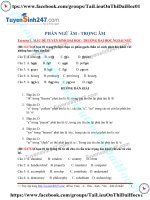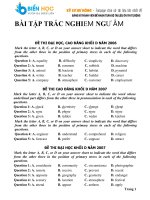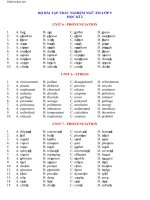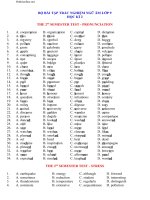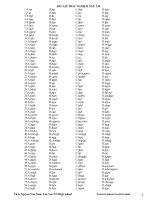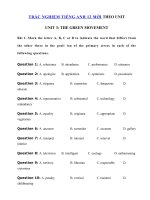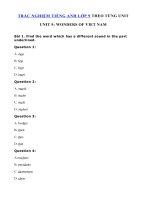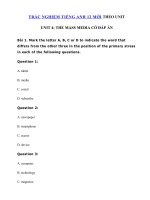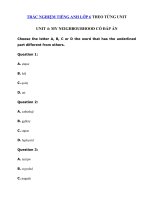Bài trắc nghiệm ngữ âm
Bạn đang xem bản rút gọn của tài liệu. Xem và tải ngay bản đầy đủ của tài liệu tại đây (405.67 KB, 18 trang )
Ngữ âm 1
STT CÂU HỎI TRẢ LỜI
1 How many syllables are there in the
2 word “know”? A. 3 B. 1
3
4 How many sounds are there in the word C. 4 D. 2
5 “six”?
6 What is the original spelling of Đáp án đúng là: 1
/bɪˈtwiːn/?
7 Vì: “Know” is a one-syllable word. This word
Choose the word with different vowel
sound: contains four letters (k, n, o, w) and two sounds
What is the IPA transcription for the word (/n/ +/əʊ/).
“listen”?
A. 2 B. 1
What effect does intonation have?
C. 3 D. 4
What is NOT a common spelling for /ɔː/
sound? Sai. Đáp án đúng là: 4
Vì: The word “six” is pronounced as /sɪks/.
A. betide B. become
C. between D. betray
Đáp án đúng là: between
Vì: The word “between” is pronounced as
/bɪˈtwiːn/ (2 syllables, 6 sounds).
A. give B. rich
C. think D. ski
Đáp án đúng là: ski
Vì: The vowel letter “i” in “ski” is pronounced
as /i:/ (others: /ɪ/).
A. /ˈlɜː.nɪŋ/ B. /lɪŋk/
C. /ˈlɪs.ən/ D. /ˈlɪp.stɪk/
Đáp án đúng là: /ˈlɪs.ən/
Vì: The word “listen” is pronounced as /ˈlɪs.ən/
(2 syllables, 5 sounds).
A. spotting which items in the message are the
most important
B. conveying differences of expressive
meaning
C. helping to divide speech into words or other
units
D. supporting the connection between the
letters and their sounds
Đáp án đúng là: conveying differences of
expressive meaning
Vì: The meaning of a sentence can be totally
changed by using different intonations. Without
intonation, it is impossible to understand the
expressions and thoughts that go with words.
A. u B. or
C. al D. a
Đáp án đúng là: u
1
Vì: “u” is the common spelling of /ʊ/ and /uː/
and /ɪ/
8 To pronounce /æ/ sound, you should A. open your mouth wide and stretch it to the
______ side.
B. open your mouth and tense your lips.
C. open your mouth and round your lips a little.
D. open your mouth a little and stretch it to the
side.
Đáp án đúng là: open your mouth wide and
stretch it to the side.
Vì: /ỉ/ is an open, unrounded and lax sound.
9 What types of vowels are /ʌ/ and /ɑː/? A. Front vowels B. Close vowels
C. Mid vowels D. Open vowels
Đáp án đúng là: Open vowels
Vì: To pronounce /ʌ/ and /ɑː/, the tongue needs
to be positioned far away from the roof of the
mouth, and the mouth is open widely.
10 What is NOT a common spelling for /ə/ A. I B. a
sound? C. e D. o
Đáp án đúng là: i
Vì: “i” is the common spelling of /ɪ/ and /iː/
11 Which word does the IPA transcription A. crawl B. crow
/krɔːl/ represent? C. cradle D. crane
Đáp án đúng là: crawl
Vì: “aw” is the usual spelling of /ɔː/. The word
ends with the /l/ sound. It has only 1 syllable, so
“cradle” is not possible.
12 Which is the correct transcription of the A. /ˈwʌmen/ B. /ˈwʊmən/
word “women”? C. /ˈwʌmən/ D. /ˈwɪmɪn/
Đáp án đúng là: /ˈwɪmɪn/
Vì: This is the plural noun of the word “woman”,
and people tend to mistake its pronunciation for
“woman”
13 Choose the word whose part in the ‘ ’ is A. c‘ir’cle B. heat‘er’
different from the others. C. ‘a’dopt D. ‘a’maze
Đáp án đúng là: c‘ir’cle
Vì: “ir” in the word “circle” is pronounced as
/ɜː/, /ˈsɜː.kəl/. The other words have /ə/ sound.
14 Which word does NOT contain /ɪ/ sound? A. listen B. building
C. dinner D. police
Đáp án đúng là: police
Vì: The word “police” is pronounced as /pəˈliːs/
with long i
15 Look at the IPA transcription of a A. |ˈstʌdɪɪŋ wʊd həv biːn |
student’s answer. Which part of this B. |taɪmkənˈsjuːmɪŋ|
C. |wɪðˈaʊt kɔːmˈpjuːtəz |
2
answer contains a mispronunciation D. |ənd ˌɪnɪˈfɪʃnt |
error? Đáp án đúng là: |wɪðˈaʊt kɔːmˈpjuːtəz |
Without computers // studying would Vì: The correct pronunciation of this word is
have been // time-consuming // and /kəmˈpjuː.tər/ with /ə/. Many words starting with
inefficient “com” are pronounced /kəm/
|wɪðˈaʊt kɔːmˈpjuːtəz ˈstʌdɪɪŋ wʊd həv
biːn ˈtaɪmkənˈsjuːmɪŋ ənd ˌɪnɪˈfɪʃnt |
16 How many sounds are there in the A. About 20 B. About 40
English language? C. About 30 D. More than 50
Đáp án đúng là: 40
Vì: There are more than 40 sounds (phonemes)
in English.
17 What is the phonetic notation system used A. APA B. IPI
to represent all of the phones in human C. API D. IPA
language? Đáp án đúng là: IPA
Vì: IPA stands for International Phonetic
Alphabet.
18 The action of pronouncing one syllable of A. connected speech.
a multisyllabic word with greater B. sentence stress.
emphasis is called ______ C. word stress.
D. intonation.
Đáp án đúng là: word stress.
Vì: The definition of word stress is “the way that
a syllable is pronounced with greater force than
other syllables in the same word”.
19 what is NOT an element of English A. intonation B. spelling
pronunciation? C. stress D. connected speech
Đáp án đúng là: spelling
Vì: Spelling is a part of writing, not
pronunciation.
20 What is the main difference between A. the length of sound
consonant and vowel sounds? B. the flow of air through the mouth
C. the openness of the mouth
D. the position of the tongue
Đáp án đúng là: the flow of air through the
mouth.
Vì: When you say a vowel, you do not block the
flow of air. When you say a consonant, you
block the flow of air.
21 To pronounce /ɜː/ sound, you should A. put the tip of your tongue behind your lower
______ front teeth.
B. raise your tongue high and push it to the
front of your mouth.
3
C. curl the tip of your tongue and point it to the
roof of your mouth.
D. place your tongue in a neutral position.
Đáp án đúng là: curl the tip of your tongue and
point it to the roof of your mouth.
Vì: to make / ɜː/, open your mouth but not too
widely. Pull back your tongue. Curl the tip of
your tongue and point it to the roof of your
mouth, but don’t touch it.
22 To pronounce /ɑː/ sound, you should A. put the tip of your tongue behind your lower
______ front teeth.
B. place your tongue in the middle of your
mouth.
C. raise the back of your tongue up.
D. curl your tongue up to the upper part of your
mouth.
Đáp án đúng là: put the tip of your tongue behind
your lower front teeth.
Vì: /ɑː/ is one of the most open vowels, so the
tongue position should be as far as possible from
the roof of the mouth.
23 Choose the word whose part in the ‘ ’ is A. f‘oo’t
different from the others. B. f‘oo’d
C. W‘oo’d
D. l‘oo’k
Đáp án đúng là: f‘oo’d
Vì: The word “food” is pronounced as /
/fuːd/with long u. The other words have short /ʊ/
sound
24 Which word does NOT contain /e/ A. even
sound? B. friend
C. bread
D. check
Đáp án đúng là: even
Vì: The word “even” is pronounced as / /ˈiː.vən/
sound
25 How is the pronunciation of /ɒ/ different A. You need to lower your jaw when making
from that of /ɔː/ ? /ɒ/
B. You need to relax your tongue and lips when
making /ɒ/
C. You need to round your lips more when
making /ɒ/
D. You need to pull your tongue back more
when making /ɒ/
Đáp án đúng là: You need to relax your tongue
and lips when making /ɒ/
4
Vì: /ɒ/ is a short and lax vowel, so you need to
relax your tongues and lips when making it.
26 How is the pronunciation of /iː/ different A. You need to open your mouth wider when
from that of /ɪ/? making /iː/
B. You need to relax your tongue and lips when
making /iː/
C. You need to pull your tongue back more
when making /iː/
D. You need to stretch your lips more when
making /iː/
Đáp án đúng là: You need to stretch your lips
more when making /iː/
Vì: /i:/ is long and tense vowel, so we need to
stretch and tense our lips more when making it
27 “a” in “apple” is… A. a sound B. a syllable
C. a letter D. a consonant
Đáp án đúng là: a letter
Vì: “A” is a vowel letter in the English alphabet.
28 What is NOT a common spelling for /ʌ/ A. aw B. o
sound? C. ou D. u
Đáp án đúng là: aw
Vì: “aw” is the common spelling of /ɔː/
29 If we say the diphthong /eə/ by itself, A. Eye B. I
which word will we have? C. Air D. Eel
Đáp án đúng là: Air
Vì: “Air” is pronounced as /eə/.
30 The two diphthongs/eə/ and /ɪə/ are A. the rising diphthongs.
______ B. the rounding diphthong
C. the centring diphthongs.
D. the rounding diphthongs.
Đáp án đúng là: the centring diphthongs.
Vì: A centring diphthong isthe one that begins
with a more peripheral vowel and ends with a
more central one (/ə/).
31 Choose the odd one out: A. Clear B. Eagle
C. Hear D. Appear
Đáp án đúng là: Eagle
Vì: “ea” in “eagle” is pronounced as /i:/ while
the others are pronounced as /ɪə/.
32 What does the speaker mean by stressing A. He did not borrow it, he bought it.
on the word “he” in “He bought a new B. It is him who bought the new car.
car”? C. It’s a car, not a bike.
D. He bought a brand-new car.
Đáp án đúng là: It is him who bought the new
car.
5
Vì: When the speaker stresses on “he”, he/she
wants to emphasise the subject of the action.
33 Which word does the IPA transcription A. decent B. desert
/ˈdez.ɚt/ represent? C. disease D. dissect
Đáp án đúng là: desert
Vì: “er” is the usual spelling of /ə/. The word
must end with the /t/ sound, and there is no /k/
34 How many /əʊ/ sounds are there in the A. 2 B. 1
sentence “They showed us their home.”? C. 3 D. 4
Đáp án đúng là: 2
Vì: Two /əʊ/ sounds can be found in “show” and
“home”
35 How many /aɪ/ sounds are there in the A. 4 B. 1
sentence “Do you like dry wine?”? C. 3 D. 2
Đáp án đúng là: 3
Vì: Three /aɪ/ sounds can be found in “like”,
“dry” and “wine”.
36 Which is the ordinary spelling A. Clearance
of /ˈklɪə.rəns/? B. Clearing
C. Cleansing
D. Cleaning
. Đáp án đúng là: Clearance
Vì: “Clearance” is pronounced as /ˈklɪə.rəns/
37 What is difference in pronunciation A. Lips relaxed vs Lips tense
between /ʊ/ and /u:/ ? B. Tongue curled vs Tongue straightened
C. Tongue pulled to the back vs tongue pulled
to the front
D. Mouth wide-open vs Mouth a little open
Đáp án đúng là: Lips relaxed vs Lips tense
Vì: The difference between these two sounds is
that the first is lax and short while the second
one is tense and long
38 How many diphthongs can you find in A. 14 B. 10
this sentence: “Stay five days outside C. 16 D. 11
and light a fire where our flowers grow Đáp án đúng là: 11
wild around the ground”? Vì: The diphthongs can be found in “St’ay’
f’i’ve d’ay’s ‘ou’ts’i’de and l’igh’t a fire wh’ere’
our flowers gr’ow’ w’i’ld ar’ou’nd the gr’ou’nd”
39 How many triphthongs can you find in A. 2 B. 0
this sentence “I’d like to buy a kilo of C. 1 D. 3
soya flour but the only place it’s Đáp án đúng là: 2
available is closed on Fridays.”? Vì: The triphthongs can be found in “soya” and
“flour”.
6
40 Choose the word with a different vowel A. Coast B. Gone
sound. C. Stone D. Closed
Đáp án đúng là: Gone
Vì: The vowel sound in “gone” is /ɒ/ while the
others are /əʊ/
41 Which is NOT a rising diphthong? A. /eɪ/ B. /ɔɪ/
C. /aɪ/ D. /aʊ/
Đáp án đúng là: /aʊ/
Vì: /aʊ/ is a rounding diphthong
42 Which sound is a diphthong? A. /aɪ/ B. /i:/
C. /ʌ/ D. /aɪə/
Đáp án đúng là: /aɪ/
Vì: /aɪ/ contains two single vowels /a/ and /ɪ/.
43 Which are the common spellings for /aɪ/ A. ey, ay
sound? B. oi, oy
C. i, ie, y, igh, uy
D. ai, ei
Đáp án đúng là: i, ie, y, igh, uy
Vì: We can find the diphthong /aɪ/ in words like
“hi”, “pie”, “by”, “high”, “buy”.
44 How many diphthongs are there in the A. 2 B. 4
sentence “The lake is a long way from C. 1 D. 3
here.”? Đáp án đúng là: 3
Vì: Three words that contain diphthongs are
“lake”, “way” and “here”.
45 Which word contains the diphthong /ɪə/? A. Nose B. Ear
C. Mouth D. Eye
Đáp án đúng là: Ear
Vì: Ear is pronounced as /ɪə/
46 Choose the word with a different vowel A. Closed B. Gone
sound. C. Coast D. Stone
Đáp án đúng là: Gone
Vì: The vowel sound in “gone” is /ɒ/ while the
others are /əʊ/
47 Which sound is a diphthong? A. /i:/ B. /ʌ/
C. /aɪ/ D. /aɪə/
Giải thích kết quả :
Đúng. Đáp án đúng là: /aɪ/
Vì: /aɪ/ contains two single vowels /a/ and /ɪ/.
48 Which is the ordinary spelling of A. Copying
/kæmˈpeɪn/? B. Campaign
C. Camping
D. Kumquat
Giải thích kết quả :
Đúng. Đáp án đúng là: Campaign
Vì: “Campaign” is pronounced as /kỉmˈpeɪn/.
7
49 How are the triphthong produced? A. Adding a vowel sound before a diphthong.
B. Gliding from a vowel to a consonant.
C. Saying two sounds quickly.
D. Adding /ə/ sound to some diphthongs.
Đáp án đúng là: Adding /ə/ to some diphthongs.
Vì: We add /ə/ to five diphthongs /eɪ/, /aɪ/, /ɔi/,
/əʊ/, /aʊ/ to make five triphthongs /eɪə/, /aɪə/,
/ɔiə/, /əʊə/, /aʊə/.
50 How many triphthongs can you find in A. 0 B. 3
this sentence: “Stay five days outside C. 1 D. 2
and light a fire whereour flowers grow Đáp án đúng là: 3
wild around theshow ground”? Vì: The triphthongs can be found in “fire”,
“our”, and “flowers”.
51 How many diphthongs can you find in A. 6 B. 10
this sentence: “I’d like to buy a kilo of C. 8 D. 12
soya flour but the only place it’s Đáp án đúng là: 10
available is closed on Fridays.”? Vì: The diphthongs can be found in “I’d l’i'ke to
b’uy’ a kil’o’ of soya flour but the ‘o’nly pl’a’ce
it’s av’ai’lable is cl’o’sed on Fr’i’d’ay’s.”
52 The symbol ˈ (e.g. in /ˈhæp.i/, /əˈbaʊt/, A. consonants.
etc.) comes before ______ B. unstressed words.
C. vowel sounds.
D. stressed syllables.
Đáp án đúng là: stressed syllable.
Vì: Stress mark “ ˈ ” is placed before a written
syllable in the respelling of a word to show that
this syllable is to be stressed when spoken.
53 What types of vowels are /iː/ and /i/? A. Close vowels
B. Open vowels
C. Mid vowels
D. Open-mid vowels
Đáp án đúng là: Close vowels
Vì: To pronounce /iː/ and /i/, the tongue needs to
be positioned close to the roof of the mouth.
54 What is a diphthong? A. A vowel in which there is a glide from one
vowel to another within a single syllable.
B. A glide from one vowel to another and to a
third.
C. A syllable that contains three vowel sounds.
D. A consonant
Đáp án đúng là: A vowel in which there is a glide
from one vowel to another within a single
syllable.
Vì: A diphthong is a vowel sound formed by the
combination of two single vowels in a syllable,
8
in which the sound begins as one vowel and
moves toward another.
55 What is the original word of /nekst/? A. net B. neck
C. nest D. next
Đáp án đúng là: next
Vì: The letter “x” in “next” is pronounced as
/ks/.
56 Choose the word whose part in the ‘ ’ is A. k‘a’rma B. d‘a’mage
different from the others. C. m‘a’mmal D. gr‘a’mmar
Đáp án đúng là: k‘a’rma
Vì: The “ar” in karma is pronounced as /ɑː/, and
this is common with words having “ar”. The
other “a” is pronounced as /æ/ sound
57 Which are the common spellings for /aʊ/ A. o, ow, oa, oe
sound? B. au, ai
C. ow, ou
D. Oi, oy
Đáp án đúng là: ow, ou
Vì: We can find the diphthong / aʊ/ in words like
“cow”, “sound”
58 Look at the IPA transcription of a A. |ˈsəʊ ˈaɪ ˈjuːʒəli |
student’s answer. Which part of this B. |ˈɡəʊ ɒf ðə ˈbet̩n tra:k|
answer contains mispronunciation errors? C. |əv ˈtʊərɪst træps |
I am tired // of tourist traps // so I usually D. |ˈaɪ əm ˈtaɪəd |
// go off the beaten track Đáp án đúng là: /ˈɡəʊ ɒf ðə ˈbet̩n tra:k/
|ˈaɪ əm ˈtaɪəd //əv ˈtʊərɪst trỉps //ˈsəʊ ˈaɪ Vì: The correct pronunciation of the word
ˈjuːʒəli // ˈɡəʊ ɒf ðə ˈbet̩n tra:k | “beaten” word is /ˈbiːtən/, and of the word
“track” is /træk/. Not only “ea” is a common
spelling of /e/, it is also a common spelling of /iː/
59 How to pronounce the second vowel /ɪ/ A. Keep your tongue wide and flat, stretch the
in /eɪ/, /aɪ/ and /ɔɪ/? back of your tongue up a little bit.
B. Lower your jaw and use your tongue tip to
touch the back of the bottom front teeth.
C. Lift your jaw and lift the front part of your
tongue arch towards the roof of the mouth.
D. Round your lips, lift your tongue and shift it
a bit back so the tip of your tongue does not
touch anything.
Đáp án đúng là: Lift your jaw and lift the front
part of your tongue arch towards the roof of the
mouth.
Vì: This is the same way as how we pronounce
the single vowel /ɪ/ sound.
60 Which is an example of a phonetic A. ha/pi B. [hap.py]
transcription? C. /ˈhæp.i/ D. /happy/
Đáp án đúng là: /ˈhæp.i/
9
Vì: This is a correct phonetic transcription of the
word “happy” using IPA symbols.
61 To pronounce /ʊ/ sound, you should A. pull your tongue back in your throat and
______ tense your lips.
B. point your tongue to the roof of your mouth
and tense your lips.
C. point your tongue to the roof of your mouth
and relax your lips.
D. pull your tongue back in your throat and
relax your lips.
Đáp án đúng là: pull your tongue back in your
throat and relax your lips.
Vì: The /ʊ/ sound is a back, short and lax vowel.
62 Which word contains the diphthong /ɔɪ/? A. Royal B. Lake
C. Escape D. Buy
Đáp án đúng là: Royal
Vì: “Royal” is pronounced as /ˈrɔɪ.əl/.
63 According to British English, which A. quality B. caught
word does NOT contain /ɒ/ sound? C. spot D. hospital
Đáp án đúng là: caught
Vì: The word “caught” is pronounced as /kɔːt/ in
the UK and /kɑːt/ in the US
64 Choose the word with a different A. hybrid B. cyber
diphthong: C. nylon D. faint
Đáp án đúng là: faint
Vì: The diphthong in “faint” is /eɪ/ while in the
other words is /aɪ/.
65 What is NOT a common spelling for /ʃ/ A. ch B. z
sound? C. sh D. c
Đáp án đúng là: z
Vì: “z” is the common spelling of /z/, not /ʃ/
66 To make /θ/ sound, you should ______ A. lightly bite your lower lip, release air
through that gap, and add your voice.
B. lightly bite your lower lip and release air
through that gap.
C. push the air through the gap between your
teeth, over your tongue, and add your voice.
D. push the air through the gap between your
teeth, over your tongue.
Đáp án đúng là: push the air through the gap
between your teeth, over your tongue.
Vì: /θ/ is an unvoiced sound, so you don’t add
your voice. Biting your lower lip is how you
make the /f/ and /v/ sounds.
10
67 Which of the following sound is voiced? A. /ð/ B. /h/
C. /θ/ D. /k/
Đáp án đúng là: /ð/
Vì: Your throat will vibrate when you make the
/ð/ sound. Its similar unvoiced sound is /d/
68 What types of consonants are /f/ and /v/? A. Voiced consonants
B. Unvoiced consonants
C. Fricative consonants
D. Stop consonants
Đáp án đúng là: Fricative consonants
Vì: To pronounce are /f/ and /v/, you need to
squeeze the air out of your mouth from a very
small gap.
69 Which word does NOT contain /z/ A. gives B. calls
sound? C. plays D. sits
Đáp án đúng là: sits
Vì: With the -s endings, we pronounce it as /z/
most of the time, but when the words end with
/p/,/t/,/k/, /f/, /θ/, we pronounce it as /s/
70 Which word contains /s/ sound? A. choose B. dresser
C. busy D. desert
Đáp án đúng là: dresser
Vì: The IPA transcript of ‘dresser’ is /ˈdres.ər/.
The ‘s’ is pronounced as /z/ in the other words
(/ˈbɪz.i/, /ˈdez.ət/, /tʃuːz/)
71 Which is the correct transcription of the A. /ˈtʃem.ɪ.stri/
word “chemistry”? B. /ˈkem.ɪ.ztri/
C. /ˈkem.ɪ.stri/
D. /ˈʃem.ɪ.stri/
Đáp án đúng là: /ˈkem.ɪ.stri/
Vì: ‘ch’ in here is pronounced as /k/ and ‘s’ is
pronounced as /s/
72 Which word does the IPA transcription A. clause B. closer
/ˈkləʊ.ʒər/ represent? C. closure D. kosher
Đáp án đúng là: closure
Vì: “s” is the usual spelling of /ʒ/. There is no
/ʃ/, so it could not be A. There is no /s/ at the end
of the word, so it could not be B. the ‘s’ in C is
pronounced as /s/
73 In the sentence "Thanksgiving is always A. 2 B. 1
on the fourth Thursday of November", C. 4 D. 3
how many /ð/ sounds are pronounced? Đáp án đúng là: 1
Vì: The words that contain /ð/ sound is ‘the’. The
other ‘th’ are pronounced as /θ/, as in
‘thanksgiving’, ‘fourth’, ‘Thursday’.
11
74 In these sentences “My dad works in a A. 6 B. 8
bank. He often comes home late. His C. 5 D. 7
hobbies are reading books and listening Đáp án đúng là: 5
to mom’s songs”, how many /z/ sounds Vì: My dad works in a bank. He often come's'
are pronounced? home late. Hi's' hobbi'es' are reading books and
listening to mom's' song's’
75 What are the spellings of /j/? A. w, g, gi
B. y, u, eu
C. j, g
D. l, ll
Đáp án đúng là: y, u, eu
Vì: The sound /j/ could be found in words like
“yes”, “usual”, “Europe”.
76 What are the spellings for /̬tʃ/? A. sh, s, x
B. t, th
C. ch, t, tch
D. tr, g
Đáp án đúng là: ch, t, tch
Vì: /̬tʃ/ sound is normally found in “ch, t, tch”
spelling.
77 The 'ge' in 'lounge' is pronounced as A. /ʒ/ B. /dʒ/
______ C. /tʃ/ D. /j/
Đáp án đúng là: /dʒ/
Vì: The word “lounge” is pronounced as
/laʊndʒ/.
78 What consonant do these words have in A. /t/ B. /ɘ/
common? C. /tʃ/ D. /dʒ/
“teacher, chair, Dutch” Đáp án đúng là: /tʃ/
Vì: The words “teacher”, “chair” and “Dutch”
are pronounced as /ˈtiː.tʃər/, /tʃeər/, /dʌtʃ/
respectively.
79 Find the odd one out: A. Genre B. Orange
C. Judge D. Dangerous
Đáp án đúng là: Genre
Vì: The word “genre” is pronounced as /ˈʒɒn.rə/.
80 Which word does NOT contain /w/ A. What B. Gain
sound? C. Language D. Question
Đáp án đúng là: Gain
Vì: The word “gain” is pronounced as /ɡeɪn/.
81 Which word contains a consonant A. Throw B. See
cluster? C. Fine D. Shout
Đáp án đúng là:Throw
Vì: The consonant cluster here is /θr/.
82 Which is a voiceless/ unvoiced sound? A. /tʃ/ B. /m/
C. /dʒ/ D. /n/
12
Đáp án đúng là: /tʃ/
Vì: /tʃ/ is a voiceless sound; the others are voiced
sounds.
83 How many affricative sounds are there A. 3 B. 4
in the sentence: “I just have to put the C. 1 D. 2
margarine back in the refrigerator.” Đáp án đúng là: 3
Vì: The affricative sounds are “I just have to put
the margarine back in the refrigerator.”
84 How many consonant clusters are there A. 5 B. 3
in the sentence: “spray the stain then C. 4 D. 2
scrub”? Đáp án đúng là: 3
Vì: The consonant clusters are: “spray the stain
and scrub”.
85 Which of the following sound is A. /d/ B. /g/
unvoiced? C. /t/ D. /ʒ/
Đáp án đúng là: /t/
Vì: Your throat will not vibrate when you make
the /t/ sound. Its similar voiced sound is /θ/
86 To make /b/ sound, you should ______ A. press the lips together to stop the air in your
mouth. Open your lips and release the air. Add
your voice.
B. lift the tip of your tongue to touch the roof
of the mouth. Pull the teeth part and the tongue
down to release the air. Add your voice.
C. press the lips together to stop the air in your
mouth. Open your lips and release the air.
D. lift the tip of your tongue to touch the roof
of the mouth. Pull the teeth part and the tongue
down to release the air.
Đáp án đúng là: press the lips together to stop
the air in your mouth. Open your lips and release
the air. Add your voice.
Vì: The /b/ sound is a voiced sound, so you need
to add your voice. “Lift the tip of your tongue to
touch the roof of the mouth. Pull the teeth part
and the tongue down to release the air” is how
you make the /t/ and /d/ sounds.
87 Which word contains /h/ sound? A. vehicle B. who
C. while D. hour
. Đáp án đúng là: who
Vì: The IPA transcript of ‘who’ is /huː/. The ‘h’
is silent in the other words. (/aʊr/ ; /waɪl/ ;
/ˈviː.ə.kəl/)
88 Which word does NOT contain /ð/ A. think B. these
sound? C. father D. without
Đáp án đúng là: think
13
Vì: The “th” in “think” is pronounced as /θ/
89 Which word contains the SAME sound A. stranger B. danger
as ‘gg in ‘lagged” C. magazine D. judge
Đáp án đúng là: magazine
Vì: Both ‘lagged’ and ‘magazine’ has the /g/
sound. The other words have the /dʒ/ sound
90 What consonant do these words have in A. /dʒ/ B. /l/
common? C. /n/ D. /ɘ/
“leave”, “learn”, “language” Đáp án đúng là: /l/
Vì: The words “leave”, “learn”, “language” are
pronounced as /liːv/, /lɜːn/, /ˈlæŋ.ɡwɪdʒ/
respectively.
91 Câu 12: A. /e/ B. ∅
The 'le' in 'double' is pronounced as C. /b/ D. /l/
______ Đáp án đúng là: /l/
Vì: The word “double” is pronounced
as/ˈdʌb.əl/.
92 How many nasal sounds are there in the A. 1 B. 2
word “mumbling”? C. 3 D. 4
Đáp án đúng là: 3
Vì: Three nasals sounds are /m/, /m/ and /ŋ/
(/ˈmʌm.bəlɪŋ/).
93 Which word is pronounced as /wɪtʃ/? A. Witty B. Which
C. Wish D. What
Đáp án đúng là: Which
Vì: The word “which” is pronounced as /wɪtʃ/.
94 How many strong /r/ sounds can you A. 3 B. 4
found in this sentence “You’re probably C. 6 D. 5
wondering why I’m writing this letter so Đáp án đúng là: 5
hurriedly”? Vì: “You’re probably wondering why
I’m writing this letter so hurriedly”
95 Which of the following two-syllable A. nouns B. verbs
words are often stressed on the C. adjectives D. adverbs
2nd syllable? Đáp án đúng là: verbs
Vì: Most two syllable verbs have stress on the 2nd
syllable
96 Which syllable of the compound nouns A. 4th syllable
is often stressed on? B. 1st syllable
C. 2nd syllable
D. 3rd syllable
Đáp án đúng là: 1st syllable
Vì: In most cases, the stress is on the first syllable of a
compound nouns. For example: ‘bookshop, ‘bus stop,
‘car park
97 The stress will often be on the syllable A. -ness, -ship, -ly B. -ee, -eer, -ese
before these endings: C. -gy, -phy, -ity D. -ian, -sion, -ance
Đáp án đúng là: -ian, -sion, -ance
14
Vì: The stress will often be on the syllable before
these endings:–ic, -ish, -ical, -sion, -tion, -ance, -
ence, -idle, -ious, -iar, -ience, -id, -eous, -acy, -ian.
98 Which words in a sentence are often A. Linking words
stressed on? B. Compound words
C. Structure words
D. Key words
Đáp án đúng là: Key words
Vì: KEY WORDS carry the meaning of the sentence.
99 How many syllables are there in this A. 4 B. 2
word “antibiotic” C. 3 D. 5
Đáp án đúng là: 5
Vì: /ˌỉn|ti|baɪ|ˈɒt|ɪk/
100 Choose the words with a different stress A. depression B. historic
pattern from the others: C. government D. destruction
Đáp án đúng là: government
Vì: ‘government’ is stressed on the 1st(/ˈɡʌv.ən.mənt/).
The others have -tion, - sion, -ic endings, so the stress is
on the syllable before the endings.
101 Choose the sentence with the correct A. Lisa is SMILING at me!
stress: You want to tell me that Lisa is B. Lisa IS smiling at me!
smiling at you, not at anyone else. What C. Lisa is smiling at ME!
do you say to me? D. LISA is smiling at me!
Đáp án đúng là: ME
Vì: Lisa is smiling at ME, not at anyone else
102 Choose the words with a different stress A. fascinating
pattern from the others: B. famous
C. celebrate
D. survive
Đáp án đúng là: survive
Vì: ‘survive’ is stressed on the 2nd syllable because it is a
2-syllable verb. The others are stressed on the 1st syllable
because ‘celebrate’ and ‘fascinate’ have ‘-ate’ ending;
‘famous’ is a 2-syllable adj.
103 Choose the sentence with the correct A. Give it back! IT is my phone!
stress: Your little brother took your B. Give it back! It IS my phone!
phone. What do you say to him? C. Give it back! It is MY phone!
D. Give it back! It is my PHONE!
Đáp án đúng là: Give it back! It is MY phone!
Vì: It is MY phone! Not yours
104 Which of the following is the most A. Tonight will be a little chilly so I’m going
reasonable stress pattern for this to bring an extra jacket.
sentence: B. Tonight will be a little chilly so I’m going
Tonight will be a little chilly so I’m going to bring an extra jacket.
to bring an extra jacket. C. Tonight will be a little chilly so I’m going
to bring an extra jacket.
D. Tonight will be a little chilly so I’m going
to bring an extra jacket.
Đáp án đúng là: Tonight will be a little chilly so
I’m going to bring an extra jacket
15
Vì: We often stress on key words (main verbs,
nouns, adjectives, adverbs) in a sentence
105 Which of the following is the most A. People are said to/ think, play, and work at
reasonable way to divide thought groups their best when/ the 24-hour temperatures
for this sentence: average/ between 17 and 23 degrees Celsius.
People are said to think, play, and work at B. People are said/ to think, play, and work at
their best when the 24-hour temperatures their/ best when the 24-hour temperatures
average between 17 and 23 degrees average/ between 17 and 23/ degrees Celsius.
Celsius. C. People/ are said to think, play/ and work at
their best when/ the 24-hour temperatures
average between/ 17 and 23 degrees Celsius.
D. People are said/ to think, play, and work/ at
their best/ when the 24-hour temperatures/
average between 17 and 23 degrees Celsius.
Đáp án đúng là: People are said/ to think, play, and work/
at their best/ when the 24-hour temperatures/ average
between 17 and 23 degrees Celsius.
Vì: Each group shows a clear meaning, and the focus
words are key words.
106 ______ is when an additional sound A. Elision B. Intrusion
“intrudes” or inserts itself between C. Assimilation D. Linking
others. Đáp án đúng là: Intrusion
Vì: We add /j/,/w/,/r/ to separate two vowel sounds. This
action is called Intrusion.
107 ______ is when a sound disappears. A. Linking B. Elision
C. Assimilation D. Intrusion
Đáp án đúng là: Elision
Vì: The consonant /d/ and /t/ may disappear completely
when the next word starts with a consonant. We call it
Elision.
108 ______ is when the end of one word A. Assimilation B. Linking
blends into another. C. Intrusion D. Elision
Đáp án đúng là: Linking
Vì: Linking is one feature of connected speech. When one
word ends with a consonant and the next word begin with
a vowel, we link the ending consonant with the next word.
109 Falling intonation is normally used in A. Run-on sentences.
______ B. Yes/No questions.
C. Exclamation.
D. Wh-questions and statements.
Đáp án đúng là: Wh-questions and statements.
Vì: Falling intonation is normally used in WH-questions
(What time do you get up?) and statements (I went to Uni
yesterday.).
110 If we pronounce the phrase “this orange” A. Elision B. Linking
as “thisorange”, which features of C. Assimilation D. Intrusion
connected speech is that? Đáp án đúng là: Linking
Vì: This is the linking feature in connected speech.
16
111 When we say “Do it”, which sound A. /s/ B. /j/
should we insert to connect these two C. /w/ D. /r/
words? Đáp án đúng là: /w/
Vì: If the first word ends in a vowel sound like /u:/ and
/ʊ/and the next word starts with any vowel sound, we
add /w/ sound.
112 How should we say the phrase “would A. /wʊʒuː/ B. /wʊlduː/
you” using connected speech? C. /wʊdʒuː/ D. /wʊʃuː/
Đáp án đúng là: /wʊdʒuː/
Vì: When a word ending in a /d/, /z/ or /dz/ sound is
followed by a word beginning with /j/ sound, we have a
new sound, /dʒ/ or /ʒ/.
113 A. hot shoes. B. hurts you.
/hɜ:tʃu:/ is the transcription for ______ C. hope you. D. heart shape.
Đáp án đúng là: hurts you
Vì: When a word ending in /t/, /s/, or /ts/ sound is
followed by a word beginning with /j/ sound, we have a
new sound, /tʃ/ or / ʃ/.
114 Sometimes you hear people say A. What are you B. Which one is
“Whatcha thinking”. So, what does C. What are D. Which are
“what cha” mean? Đáp án đúng là: What are you
Vì: Whatcha is a nonstandard contraction of “what are
you” or “what have you” in spoken language. This is a
combination of Elision and Assimilation.
115 What is a thought group? A. A unit of sound
B. A unit of meaning
C. A unit of pronunciation
D. A unit of thinking
Đáp án đúng là: A unit of meaning
Vì: A thought group isa group of approximately two to
five words that form a unit of meaning.
116 How many words are stressed on the A. 6 B. 5
3rd syllable on this sentence? C. 4 D. 3
Today's presentation will help you Đáp án đúng là: 3
understand the impact of these Vì: The IPA transcript is
technologies for people with disabilities |təˈdeɪz ˌprɛzɛnˈteɪʃən wɪl hɛlp juː ˌʌndəˈstænd ði ˈɪmpækt
while giving you the tools to begin ɒv ðiːz tɛkˈnɒləʤiz fɔː ˈpiːpl wɪð ˌdɪsəˈbɪlɪtiz waɪl ˈgɪvɪŋ juː
implementing them in your library. ðə tuːlz tuː bɪˈgɪn ˈɪmplɪmɛntɪŋ ðɛm ɪn jɔː ˈlaɪbrəri.|
117 How many words are stressed on the A. 6 B. 5
2nd syllable on this sentence? C. 7 D. 8
To begin, I will share some success Đáp án đúng là: 7
stories or examples of the impact that Vì: The IPA transcript is
adaptive technology for computers and |tuː bɪˈgɪn, aɪ wɪl ʃeə sʌm səkˈsɛs ˈstɔːriz ɔːr ɪgˈzɑːmplz ɒv
electronic resources has had for people ði ˈɪmpækt ðæt əˈdæptɪv tɛkˈnɒləʤi fɔː kəmˈpjuːtəz ænd
with disabilities ɪlɛkˈtrɒnɪk rɪˈsɔːsɪz hæz hæd fɔː ˈpiːpl wɪð ˌdɪsəˈbɪlɪtiz|
118 What is the meaning of this sentence if A. It's not true that I think he should get the
the speaker stresses on the word job.
“that” in “I don't think he should get that B. He should get another job.
job” C. Somebody else should get that job.
17
D. In my opinion it's wrong that he's going to
get that job.
Đáp án đúng là: He should get another job.
Vì: not that job, but another job
119 When we say “used power” as A. /t/ B. /w/
/juːz.paʊə/, which sound is missing? C. /d/ D. /s/
Đáp án đúng là: /d/
Vì: This is the elision feature in connected speech.
120 Using rising intonation when saying A. confirm information.
“really?” to ______ B. show certainty.
C. express doubt or surprise.
D. signal the incompleteness.
Đáp án đúng là: express doubt or surprise.
Vì: The pitch of the voice rises at the end of a sentence
to express doubt or surprise
121 How can we say the phrase “Now and A. /naʊ.rənen/
then”? B. /naʊ.rən.ðen/
C. /naʊn.ðen/
D. /naʊ.wən.ðen/
Đáp án đúng là: /naʊ.wən.ðen/
Vì: This is the intrusion feature of connected
speech.
122 Rising intonation is normally used in A. Statements.
______ B. Yes/No questions.
C. Completed sentences.
D. Wh-questions.
Đáp án đúng là: Yes/No questions.
Vì: Rising intonation is often used in Yes/No questions
(Do you like animals?).
18
